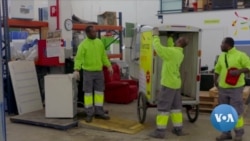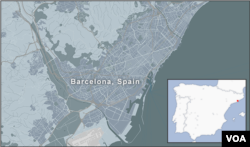Day and night across the backstreets and industrial zones of Barcelona, an underworld army of migrant recyclers toils away, largely unnoticed by the millions of tourists visiting the city every year.
Look carefully and they are a common sight in every neighborhood: mainly African migrants working alone, heaving shopping carts full of scrap metal scoured from building sites and backyards often weighing hundreds of kilograms.
It is back-breaking and badly paid work. But it is a means of survival for hundreds, if not thousands of newcomers to the city. A cart-load of scrap can be sold to recycling firms for the equivalent of about $35, or $50 dollars if they’re lucky.
Supporters say they are doing a valuable job cleaning the city. Critics argue they are part of a black market increasingly run by criminal gangs who exploit the migrants.
So authorities are stepping in to clean up the business. "Alencop" is a city-run cooperative that offers some protection for the collectors.
"Alencop" offers Barcelona residents timetabled collections and special appointments; collection by van or bike; and most importantly, job security and a guaranteed price for the migrants. Among them is Eric Kata who arrived in Spain last year from Ghana.
“Alencop has done many things for me. Because I entered Alencop without papers, without anything. But now I have my documents,” he told VOA.
Many of Kata’s friends already had made the journey to Europe and had warned him of the dangers crossing the Mediterranean Sea. Kata was jubilant when he arrived on Spanish shores, but was unprepared for how tough life would be.
“What is different is that I did not know that if I entered here, things would be as difficult as I’m getting here [now]. Because I though Europe is very rich, as I heard before. But then as I entered here, things were not as I was thinking.”
African migrants coming to Europe dream of landing a good job, but the reality usually is much harder: working on the streets, collecting garbage, or picking fruit and vegetables in the fields. The migrants aren’t legally allowed to work while they wait for asylum claims to be processed, which can take months or years. So they are forced into the black market.
More than 55,000 migrants have arrived in Spain in 2018, a sharp rise from previous years. The influx has sparked tensions in some parts of the country. The anti-migration, far-right ‘Vox’ party gained its first seats earlier this month in regional elections in the southern region of Andalusia –where many migrants arrive across the Mediterranean from Morocco.
'Manteros'
Many of the migrants head further north to Barcelona, with its vibrant economy and easy access to the rest of Europe.
Some have carved out their own commercial niche in the city selling counterfeit goods on the streets. They are known as ‘manteros’ because they sell their goods on blankets, or ‘mantas’ in Spanish. If the police come, everything is wrapped in the blanket for a quick getaway.
Local store owners fear they are losing business. Fermín Villar, spokesperson for the campaign group Top Manta, set up by Barcelona shopkeepers, says there is little incentive for the migrants to exit the black market.
“There are those who have become so accustomed to the profits from selling illegal goods that it does not compensate them to enter the legalized and regulated world. To be a host country, we have to manage immigration quickly. If not, society will reject it, as we are seeing lately in the regional Andalusia elections. And that is a danger, because nobody wins,” Villar told VOA in an interview.
The sharp rise in the number of migrants arriving in Spain is ramping up pressure on the government to stem the flow of new arrivals – and to better integrate the migrants already here.







